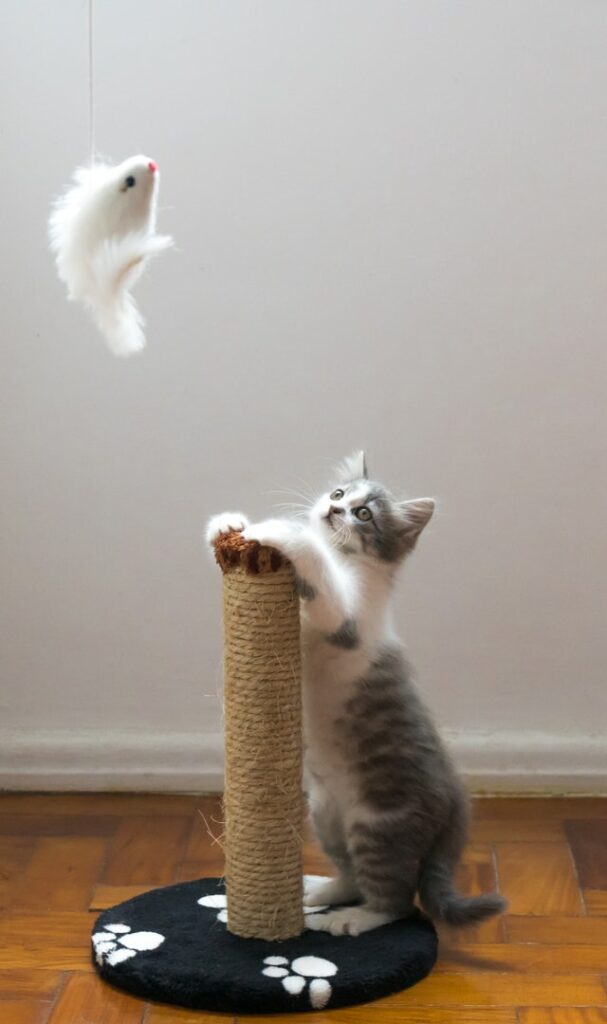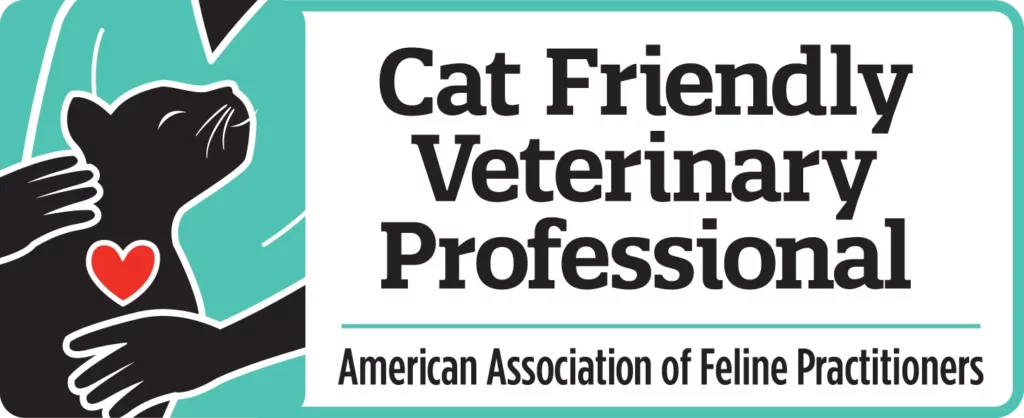I got started working with cat behavior after my own normally very sweet cat suddenly became unusually aggressive toward me. It was terrifying and extremely stressful. I remember thinking after each episode, “Why is my cat biting me? What am I doing wrong? He was just so sweet earlier.”
Biting cat result from a wide range of causes from medical issues to your cat’s history to how you’re interacting with them. We’ll go over the basics here. If you still aren’t able to figure out what’s going on, setting up a consultation with me is a great next step so I can assess the situation.
Biting In Kittens And Younger Cats
Sometimes the age of a cat can clue you in as to why your cat is biting. Younger cats and kittens tend to be more playful and explore the world. They may try using their mouth to play with or gather information about things in their environment. While this is a normal behavior for kittens, it can be distressing for humans!

Some clues that your cat may exhibit playful biting, sometimes called play aggression, include a lack of vocalizations, pouncing, and the cat having control over their biting. Often, the cats are easily distracted and redirected toward a toy. While these behaviors may occur more frequently in kittens, they can occur even in adult or senior cats.
Of course, play isn’t the only reason young cats bite. A cat biting could signal something fear-based. If the kitten is shy or not well-socialized, they may bite when approached or handled in a way they don’t appreciate. Thankfully, if you start working on helping the cats become less fearful, you can reduce the risk of this happening. You can start with something easy like a pheromone diffuser to help your cat feel more secure. If that doesn’t help, more intense intervention may be necessary.
Why Senior Cats Bite
As cats age, their bodies tend to develop wear and tear similar to ours. One of the ways aging can show up in senior cats is by new medical conditions developing or cats developing painful conditions. Cats are notorious for hiding pain so your cat may seem fine, but actually be in pain. Both pain and certain medical conditions can lead to cat biting.
While not all senior cats biting is the result of a medical condition, it’s worth having them evaluated by a veterinarian to rule out medical conditions as addressing any discomfort they’re experiencing may help them feel less crabby. This will ultimately lead to less biting. It’s also worth having a veterinarian evaluate a cat of any age that develops a sudden change in behavior or becomes aggressive out of nowhere.
It also is worth advocating for your cat if you are concerned about medical conditions or pain. Try asking directly for an evaluation for pain if you are concerned. It’s especially important that you ask directly if your cat is declawed as this can lead to an increase in biting due to pain as your cat ages. You want to make sure this is ruled out!
Cat Bites In All Age Groups
Outside of seniors and kittens, there are a few common reasons cats may bite. Fear was mentioned briefly earlier, but it can occur in adult cats too. If you cat is stressed out by noises, a dog in the home, or something else that is causing them to be afraid, they’ll be more likely to bite. You can also escalate a cat that may not have aggressed if you use a squirt bottle and they end up being more fearful so I don’t recommend using them to stop behaviors.
Overstimulation
Cats bite sometimes because they’re overwhelmed and they’re trying to tell you to stop doing something. This is often seen if your cat is being petted and suddenly bites you. You may also get a warning bite gesture if you’re lucky.
The best approach? Short petting sessions with frequent breaks. Only pet your cat in places they want to be petted, even if you want to pet them somewhere else. Basically, respect your cat’s preferences.
Territoriality
Do you seem to get bitten when you walk by a certain location? What about when you get near your cat’s litter box or walk by a certain resource of your cat’s? They may be displaying territorial behavior.
If territoriality is the problem, the solution usually is adding in more stuff for your cat. If you’ve been thinking about getting another cat tree, now is the time to do so. Scratching posts are also a great choice as they allow your cat to mark their territory. Really, anything you add from places for your cat to climb to a high quality water fountain, can help your cat feel better in their space and be less likely to bite you.
Redirection
If your cat is frustrated by seeing something they want to hunt outside or due to conflict with another cat, they may become so distressed that they take out their frustration on something else. It could be another cat or even you.
Redirected aggression can be challenging to identify unless you have a known trigger. For example, if your cat bites whenever they see another cat, then you may have redirected aggression. If they see another cat outside and display body language indicating they are upset, that may be redirected aggression. Keep in mind the cats may be coming by when you’re not awake so I suggest setting up a security camera with night vision, recording, and motion detection.
Why Is My Cat Biting Me And How Do I Stop It?
While this certainly isn’t meant to be an exhaustive guide on aggressive behavior in cats, hopefully you’ve gotten some ideas on why your cat is biting. Begin observing any patterns to timing of when it happens and what is going on before your cat bites. Your cat’s behavior may not perfectly fit one single reason perfectly, but whatever is closest can give you clues.
The solution to stopping cat bites is to address the underlying issue. If your cat is trying to play with you, redirect them to a fun cat toy and make sure they get plenty of mental stimulation. If your cat is redirecting their aggression toward you due to an outdoor cat walking by, you can cover the windows with a window film. For medical conditions, work with your veterinarian to get the medical condition treated.
If you’re really not sure what to do or you try some things that don’t quite help, it may be time to get professional cat behavior help.










